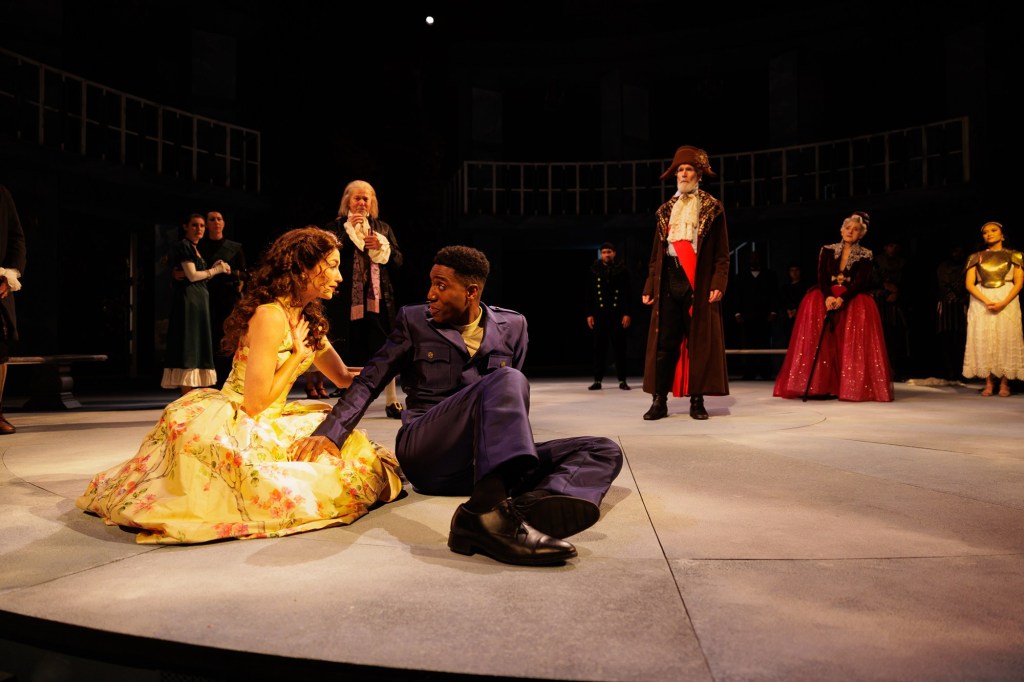William Shakespeare’s “All’s Well That Ends Well” has long been grouped with the Bard’s so-called “problem plays” because it defies easy classification.
Although the play has situations like those in the playwright’s comedies “Twelfth Night” and “Much Ado About Nothing,” the characters in “All’s Well” are more complex and flawed. A new production of the play finished up its run Sunday on the Old Globe’s outdoor festival stage in Balboa Park. The second play of the Globe’s summer Shakespeare season, “The Comedy of Errors,” will open July 27 and run through Aug. 24.
For many Globe-goers who saw “All’s Well,” this may have been their first experience with the play, since the company hasn’t produced it onstage since 2007. Directed by Peter Francis James, this production didn’t shy away from the play’s darker elements, nor did it soften the sharp edges of its morally ambiguous characters. Instead it honored Shakespeare’s intentions, celebrated the play’s ribald wit, playfully satirized the intentionally buffoonish French and Italian nobles and filled the stage with dance, action, color and humorous interludes.
At moments, director James tossed in anachronistic humor to heighten the play’s accessibility for modern audiences, including a famous line from “Macbeth” and a reference to the “Lord of the Rings” character Bilbo Baggins. He also amusingly turned a mounted battle scene into a choreographed gavotte, performed with wooden swords and hobby horses.
The play is about Helena, the orphaned daughter of the French king’s physician. When Helena creates a potion that saves the king’s life, he repays her by ordering the man she’s obsessed with, Count Bertram, to marry her against his will. Rather than consummate the marriage, the Count sneaks off to war, but Helena tracks him down in Florence and tricks him into having sex with her rather than the local girl he covets, Maria.
As Bertram, Gabriel Brown played well the spoiled and despicable cad. Ismenia Mendes’s Helena started out shrill and obsessive, but over the course of the play her voice and demeaner softened and matured. Mary Lou Rosato was a warm and anchoring presence as Bertram’s kind mother, the Countess of Roussillion.
Angelynne “Ajay” Pawaan had a noble ferocity as the virtuous Maria. Barzin Akhavan found the good and bad in his morally compromised character Parolles. And, as the court fool Lavatch, Matthew J. Harris exuberantly reveled in the naughty double-entendres in scenes about virginity and sex.
The production in the Lowell Davies Festival Theatre featured open-backed scenery by Lawrence E. Moten III that showed off the tree grove behind the Globe and it featured costumes by Judith Dolan, lighting by Sherrice Mojgani, sound by Melanie Chen Cole and additional staging and choreography by Javier Velasco.
“All’s Well that Ends Well” is not one of Shakespeare’s better plays. In the printed program, James said in an interview that Shakespeare shelved the play before he died and it was never produced until 125 years after his death. As a result, it lacks the Bard’s usual polish. Some of its scenes are derivative and its secondary characters are under-developed. Nonetheless, James made the most of the material in the stylish, engaging and clear-minded production.
